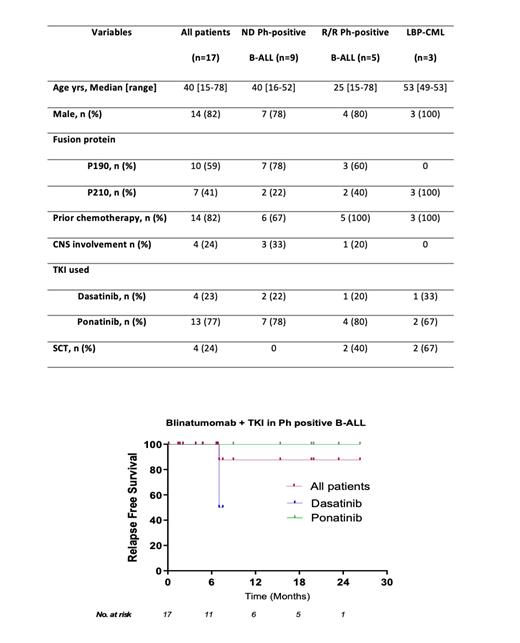Background:
Ph-positive B-ALL has long been considered an adverse cytogenetic abnormality in ALL, and it is generally recommended to proceed with a stem cell transplant (SCT) in first remission. Historically, the addition of Tyrosine Kinase Inhibitors (TKI) to the stander chemotherapy backbone improved long-term survival, with better results noted in the second-generation than in first-generation TKIs. Recent reports on a non-chemotherapy-based approach with the combination of immunotherapy (Blinatumomab) and TKI showed encouraging results and potentially eliminated the need for consolidative SCT (Foà NEJM 2020, Jabbour Lancet Haematol 2023). In this retrospective analysis, we reviewed all Ph-positive B-ALL treated with blinatumomab and TKI at two major academic centers.
Methods:
A retrospective review of adolescents and adults (14 years or older) with Ph-positive B-ALL patients who received blinatumomab with TKI at two major institutions (KFSHRC & KFMC) between 7/2018 and 7/2023. Patients who received up to 3 cycles of chemotherapy before being transitioned to therapy with blinatumomab and TKI were considered as frontline if there was no history of relapsed disease. Relapse/refractory patients with Ph-positive B-ALL treated with blinatumomab and TKI were also included in the R/R cohort, excluding patients with prior single-agent exposure to blinatumomab or ponatinib. Patients with a history of CNS disease were included. Chronic myeloid leukemia in a lymphoid blast phase (LBP-CML) treated with blinatumomab and TKI were also included. Patients were assessed for toxicity as well as for efficacy.
Results:
We identified 17 patients, with a median age of 40 yrs (range, 15-78): 9 pts (53%) were frontline Ph-positive B-ALL, 5 (29%) pts were relapsed/refractory Ph-positive B-ALL, and 3 (18%) were LBP-CML patients. Pt characteristics and outcomes by cohort are outlined in Table. All patients in all the cohorts achieved complete remission and were included in the RFS analysis [ Figure]. Of 7 evaluable pts in the frontline cohort, all patients achieved complete molecular response (CMR) using PCR for BCR::ABL (CMR=100%). No relapse was documented, with a median follow-up of 6.9 months. In the relapse/refractory cohort, all patients achieved complete molecular response (CMR) using PCR for BCR::ABL (CMR=100%). No relapse was documented, with a median follow-up of 6.7 months.
In 3 patients with LBP-CML, two patients achieved complete molecular response (CMR) using PCR for BCR::ABL, and one patient achieved MMR (0.036%). No relapse was documented, with a median follow-up of 19.7 months. Only four patients proceeded to SCT, two with LBP-CML and two with newly diagnosed Ph-positive B-ALL. All patients proceeded with SCT in CMR except one with LBP-CML with positive PCR for BCR::ABL at 0.03%, although with undetectable MRD by flow cytometry (<0.01%).
Patients were treated with dasatinib (4 patients) and ponatinib (13 patients). The median number of blinatumomab cycles was 4 (1-5). One death occurred at seven months in a patient treated with dasatinib and blinatumomab. The patient presented to the emergency department with pleural effusion and cardiac tamponade and died during her ICU stay with infectious complication. The death is likely contributed to by dasatinib.
Conclusion:
Although with short follow-up, combining TKI with blinatumomab seems to have a high complete molecular response rate in patients with newly diagnosed and relapsed/refractory Ph-positive B-ALL. Similar to prior reports, patients with newly diagnosed Ph-positive B-ALL perhaps they could be spared the toxicities associated with chemotherapy and the need for allogeneic hematopoietic stem-cell transplantation in the first remission using this approach. Further evaluation of this novel strategy is warranted.
Disclosures
Alfayez:Abbvie: Research Funding; Pfizer: Honoraria; Novartis: Honoraria; Biologics: Consultancy, Honoraria; Johnson & Johnson: Consultancy, Honoraria, Research Funding; AstraZeneca: Honoraria; Astellas: Honoraria; Amgen: Honoraria.


This feature is available to Subscribers Only
Sign In or Create an Account Close Modal